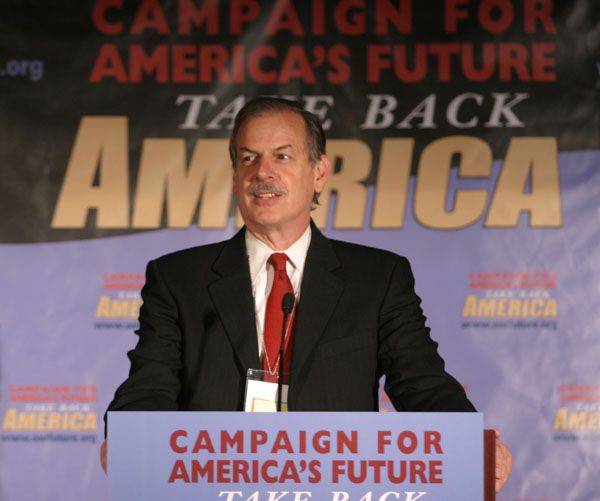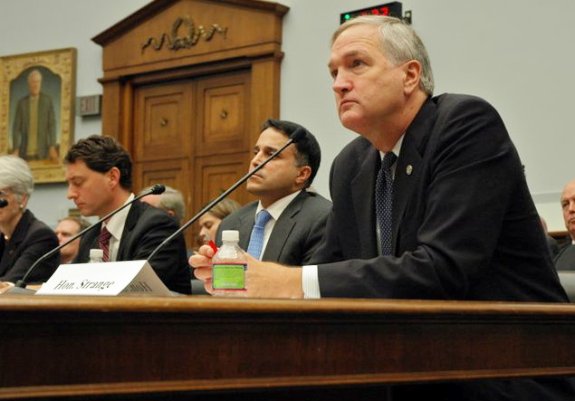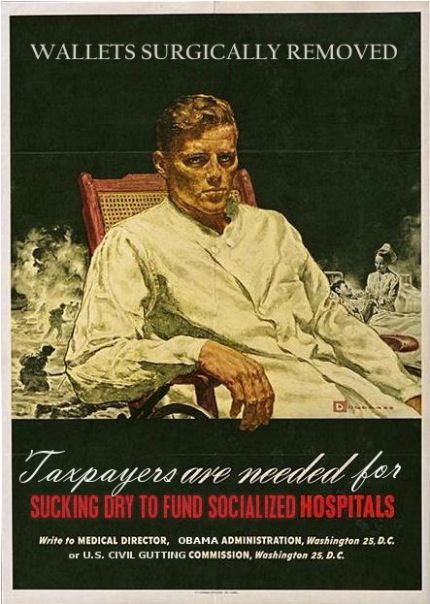
A George Soros-funded radical think tank with close ties to the Democratic Party has launched a new website urging politicians and activists to wage class warfare while hailing what it calls a new era in politics – the use of class warfare to win elections.Continue reading Klein's report here.
WageClassWar.org was launched last week by the Campaign for America’s Future, or CAF.
CAF’s co-director, Robert Borosage, explained the need for such a website.
“America’s growing diversity and its increasingly socially liberal attitudes played a big role in this election. But looking back, we are likely to see this as the first of the class warfare elections of our new Gilded Age of extreme inequality,” he wrote in a statement.
“More and more of our elections going forward will feature class warfare – only this time with the middle class fighting back. And candidates are going to have to be clear about which side they are on,” he wrote.
Continued Borosage: “In 2012, candidates who supported the economic interests of the many over the few won their elections. Populism was the voice, but economic opportunity was the message. The pundits may wring their hands, but in the future it won’t be values voters, angry white men or soccer moms that win elections. It will be class war.”
The website does not feature a mission statement and is unclear about exactly how the group will go about attempting to wage class warfare.
The site explains how Obama’s 2012 campaign utilized class warfare and set the stage for the deployment of such tactics in future elections.
But readers can go right to the website, which features Borosage's introductory exhortation for the progressive class-warfare agenda, "Waging Class War":
Needless to say, Obama is neither by temperament nor predilection a populist class warrior. But faced with potential defeat, he turned to what works. The depths of the Obama presidency came in the summer of 2011 after the debt ceiling debacle, in which the president was roughed up by Tea Party zealots, and emerged looking weak and ineffective.And the conclusion to Borosage's declaration of war:
Obama came back by deciding to stop seeking back-room compromises with people intent on destroying him and to start making his case. In the fall, he put out the American Jobs Act and stumped across the country demanding that Republicans vote on it. His standing in the polls began to rise. Then Occupy Wall Street exploded, driving America’s extreme inequality and rigged system into the debate. In December, the president embraced the frame: He traveled to Osawatomie, Kansas, revisiting a campaign stop Teddy Roosevelt had made in the first Gilded Age. He indicted the “you’re on your own” economics of Republicans while arguing that “this is a make-or-break moment for the middle class, and for all those who are fighting to get into the middle class.”
In the run-up to the election, the president’s campaign employed two basic strategies. First, the president consolidated his own coalition. He defended contraception and pay equity while his campaign attacked the Republican “war on women.” He reached out to Hispanics by ending the threat of deportation for the Dream kids. He not only ended “don’t ask, don’t tell,” but also moved to embrace gay marriage. Widely described as socially liberal measures, these were also profoundly bread-and-butter concerns. Could women choose when to have children? Could Hispanic children be free to pursue the American dream? Could gay people gain the economic benefits of marriage?
At the same time, the president’s campaign made a risky but remarkably successful decision. Their opinion research showed that painting Romney as a flip-flopper had little traction, but the attacks on vulture capitalism hit home. They decided to spend big money early in such key states as Ohio on a negative ad barrage defining Romney as the heartless vulture capitalist from Bain. Both campaigns believe that Romney never recovered.
More and more of our elections going forward will feature class warfare — only this time with the middle class fighting back. And candidates are going to have to be clear about which side they are on. Politicians in both parties are now hearing CEOs telling them that it is time for a deal that cuts Medicare and Social Security benefits in exchange for tax reform that lowers rates and closes loopholes. Before they take that advice, they might just want to look over their shoulders at what will be coming at them.This is very useful, for it puts the lie to the left's own words that this president was going to heal the country's divisions and govern as a post-partisan leader amid the emergence of transcendent progressive benevolence. There have been so many lies over the last few years, but this is one of the biggest, now actually embraced by top Democrats as a badge of honor and a program to destroy the enemy.
This is also useful as a reminder of just how far left the mainstream of the Democrat Party has moved. Here's the Borosage entry at Discover the Networks:
A former New Left radical and onetime Director of the Institute for Policy Studies (IPS), Robert Borosage co-founded (with Roger Hickey) both the Campaign for America’s Future and the Institute for America’s Future. He also founded and currently chairs the Progressive Majority Political Action Committee, the activist arm of a political networking organization whose aim is to help elect as many leftist political leaders as possible. In addition, he is a contributing editor at The Nation magazine and a regular contributor to The American Prospect.Backstage at an A.N.S.W.E.R. rally? International ANSWER is the residual protest arm of the Stalinist World Workers Party. It's been on the leading edge of the most radical left wing agitation since the early George W. Bush administration. There are all kinds of interlocking ties between groups like this and the mainstream of the Democrat Party, although President Obama and institutional Democrats have long attempted to mainstream their activities and distance themselves from the revolutionary shock troops.
Borosage attended Yale Law School and earned a graduate degree in International Affairs from George Washington University. In 1974 he established the Center for National Security Studies, a civil rights / civil liberties organization that regularly accuses the CIA and the FBI of rampant abuses.
From 1979 to 1988 Borosage was Director of the Institute for Policy Studies. In 1988 he left IPS to work on Jesse Jackson’s presidential campaign, for which he served as a speechwriter and an assistant in framing responses to policy issues.
Borosage also has worked for such political figures as Senators Paul Wellstone, Barbara Boxer, and Carol Moseley-Braun.
In 1989 Borosage founded the Campaign for New Priorities, which called for decreased federal spending on the military and greater allocations for social welfare programs.
In 1996 Borosage and Roger Hickey co-founded the Campaign for America's Future (CAF), and three years later they established a sister organization, the Institute for America's Future (IAF).
Each year, CAF holds a “Take Back America” conference which the organization describes as “a catalyst for building the infrastructure to ensure that the voice of the progressive majority is heard.” Speaking at one such event in Los Angeles in June 2001, Borosage characterized President George W. Bush’s policies as a mélange of “tax cuts for the wealthy,” “arsenic in the water,” and “salmonella in the food”....
In a November 2002 L.A. Weekly article, The Nation editor David Corn quoted what Borosage had said backstage during a recent anti-war rally sponsored by International A.N.S.W.E.R. According to Corn, Borosage stated: "This [rally] is easy to dismiss as the radical fringe, but it holds the potential for a larger movement down the road…. History shows that protests are organized first by militant, radical fringe parties and then get taken over by more centrist voices as the movement grows. They provide a vessel for people who want to protest."
Here's more background, on the founding contingents of the Campaign for America's Future:
Approximately 130 people played a role in co-founding the Campaign for America's Future (CAF) in 1996. Among these individuals were: Mary Frances Berry, Julian Bond, Heather Booth, Robert Borosage (co-founder), John Cavanagh, Richard Cloward, Jeff Cohen, Ken Cook, Peter Dreier, Barbara Ehrenreich, Betty Friedan, Todd Gitlin, Heidi Hartmann, Tom Hayden, Denis Hayes, Roger Hickey (co-founder), Patricia Ireland, Jesse Jackson, Joseph Lowery, Steve Max, Gerald McEntee, Harold Meyerson, Frances Fox Piven, Robert Reich, Mark Ritchie, Arlie Schardt, Susan Shaer, Andrew Stern, John Sweeney, and Richard Trumka. To view the full list of co-founders, click here.It's also useful to troll around over at the CAF website, where one finds Borosage agitating on the current fiscal cliff negotiations, "The Grand Betrayal":
The battle lines are being drawn. The AFL-CIO, SEIU and AFSCME have announced labor’s opposition to cuts in entitlement programs and to continued tax cuts for the rich. Groups representing the base of the Democratic Party—from African-Americans to Latinos, women and the young—are lining up around a four-point program calling for jobs first; protecting Medicare, Medicaid and Social Security; letting the top-end Bush tax cuts expire; and protecting programs for the vulnerable.Well, the battle lines are being drawn alright.
Reaching no deal is preferable to a bad one that cuts entitlements. Going over the so-called fiscal cliff is perilous, but probably preferable to a bargain under the terms currently in play. With no agreement, the Bush tax cuts would expire. In January the Senate would immediately push to revive the lower rates for everyone but the top 2 percent. Republicans could vote for tax cuts, but rates at the top would rise. The automatic spending cuts would not kick in immediately (although the stock market might feel the hit quickly). But the thing to remember about failure to reach a deal before January is that Medicare, Social Security and many programs for the most vulnerable are shielded from the cuts. And the new Congress would likely act rapidly to reverse the cuts to military and domestic spending. The already faltering recovery would surely weaken, threatening the loss of more jobs. But that might force Congress to address the real crisis—jobs and growth—rather than court a ruinous austerity.
Whatever the outcome, the battle is likely to be only the first skirmish of a defining struggle over the future of the Democratic Party and the progressive movement. We’ve just had what might be called the first of a new era of class-warfare elections. The plutocracy ran one of their own, on their agenda and with their money. The American people’s rejection of Mitt Romney, despite the lousy economy, demonstrated the declining appeal of the conservative, trickle-down agenda. The budget debate will draw battle lines within the Democratic Party, between the Wall Street–dominated New Democratic wing and the progressive wing fighting for the change this country desperately needs.
We are headed into a new era of upheaval. Our money-soaked politics may suffocate growing demands for change. But if Democratic legislators join the president in a grand betrayal, they may witness a powerful Tea Party movement from the left, as Republican legislators have from the right.
But remember, as Rush Limbaugh warned, the politics of the fiscal cliff aren't really about fiscal policy. They're about destroying the Republican Party. This Wage Class War initiative just comes right out in the open with it, which is good. Let's not pretend that Americans are one country with a few minor differences on the margins. We're indeed in a political war for the survival of the America that we grew up with, one, in my lifetime, marked by decency in overcoming oppression, and in expanding political and economic opportunity to growing numbers. But don't care about any of that. They have been taken over by the most radical elements of the '60s counter-culture and New Left revolutionary cadres. These are Marxist-Leninists in suits. Their man is now in office for a second term after having bludgeoned the so-called political embodiment of corporate power, GOP nominee Mitt Romney --- a man who was wholly unprepared for the onslaught of progressive blood libel and demonization that was thrown down throughout the campaign.
So conservatives can just suck it up and man the ramparts for the battles that are coming. The left's isn't even pretending to hide its program of fundamental transformation of the country, enunciated so well and violently by top Democrat Party hack Robert Borosage and his fellow subversives of the progressive movement.





 MEXICO'S LABOR LAW REFORM SPARKS MASSIVE PROTESTS
MEXICO'S LABOR LAW REFORM SPARKS MASSIVE PROTESTS